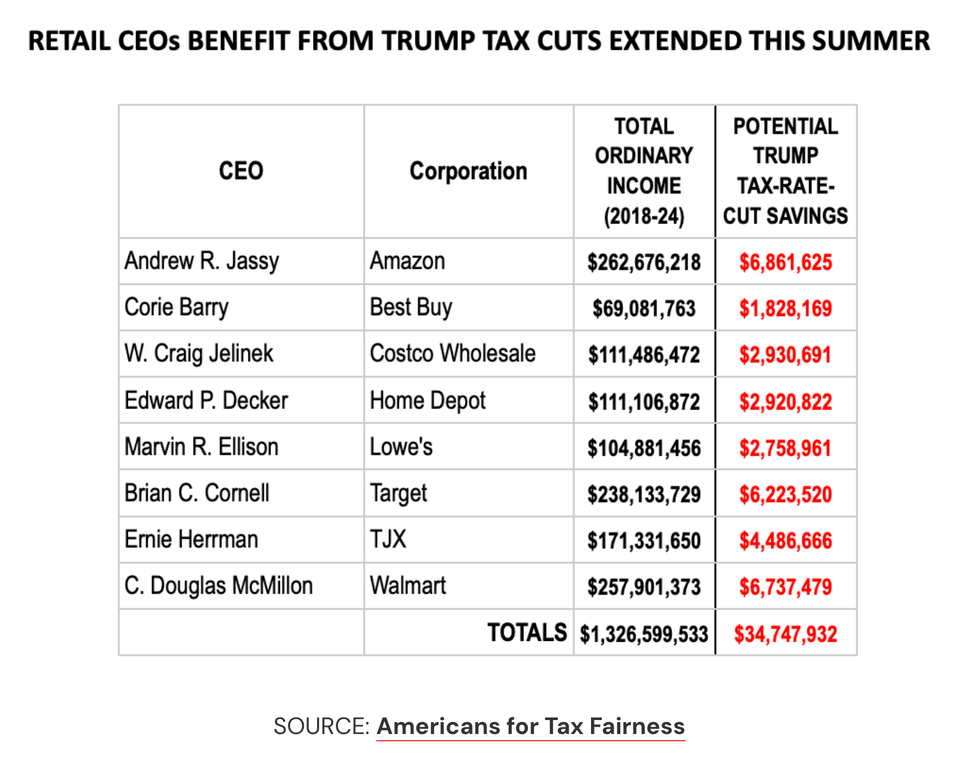The study examined four health insurance companies—Centene, Cigna, Elevance (formerly Anthem), and Humana; two for-profit hospital chains—HCA Holdings and Universal Health Services; and the CVS Healthcare pharmacy conglomerate.
It found that these companies' average profits increased by 75%, from around $21 billion before the tax bill to about $35 billion afterward, and yet their federal tax rate was about the same.
This was primarily due to the 2017 law's slashing of the corporate tax rate from 35% to 21%, a change that was cheered on by the healthcare industry and continued with this year's GOP tax legislation. The legislation also loosened many tax loopholes and made it easier to move profits to offshore tax shelters.
The report found that Cigna, for instance, saved an estimated $181 million in taxes on the $2.5 billion it held in offshore accounts before the law took effect.
The law's supporters, including those in the healthcare industry, argued that lowering corporate taxes would allow companies to increase wages and provide better services to patients. But the report found that "healthcare corporations failed to use their tax savings to lower costs for customers or meaningfully boost worker pay."
Instead, they used those windfalls primarily to increase shareholder payouts through stock buybacks and dividends and to give fat bonuses to their top executives.
Stock buybacks increased by 42% after the law passed, with Centene purchasing an astonishing average of 20 times more of its own shares in the years following its enactment than in the years before. During the first seven years of the law, dividends for shareholders increased by 133% to an average of $5.6 billion.
Pay for the seven companies' half-dozen top executives increased by a combined $100 million, 42%, on average. This is compared to the $14,000 pay increase that the average employee at these companies received over the same period, which is a much more modest increase of 24%.
And contrary to claims that lower taxes would allow companies to improve coverage or patient care, the opposite has occurred.
While data is scarce, the rate of denied insurance claims is believed to have risen since the law went into effect.
The four major insurers' Medicare Advantage plans were found to frequently deny claims improperly. In the case of Centene, 93% of its denials for prior authorizations were overturned once patients appealed them, which indicates that they may have been improper. The others were not much better: 86% of Cigna's denials were overturned, along with 71% for Elevance/Anthem, and 65% for Humana.
The report said that such high rates of denials being overturned raise "questions about whether Medicare Advantage plans are complying with their coverage obligations or just reflexively saying 'no' in the hopes there will be no appeal."
Salespeople for the Cigna-owned company EviCore, which insurers hire to review claims, have even boasted that they help companies reduce their costs by increasing denials by 15%, part of a model that ProPublica has called the "denials for dollars business." Their investigation in 2024 found that insurers have used EviCore to evaluate whether to pay for coverage for over 100 million people.
And while paying tens of millions to their executives, both HCA and Universal Health Services—which each saved around $5.5 billion from Trump's tax law—have been repeatedly accused of overbilling patients while treating them in horrendous conditions.
"Congress should demand both more in tax revenue and better patient care from these highly profitable corporations," Americans for Tax Fairness said in a statement. "Healthcare corporation profitability should not come before quality of patient care. In healthcare, more than almost any other industry, the search for ever higher earnings threatens the wellbeing and lives of the American people."





